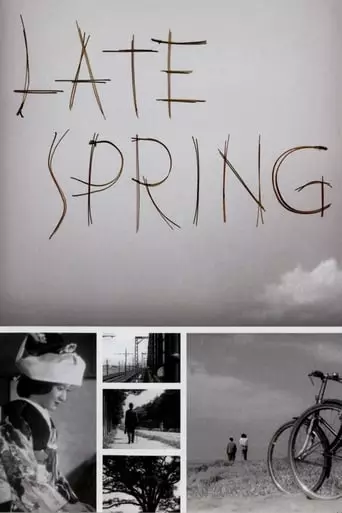
Late Spring (1949) Watch Online Free
Noriko is perfectly happy living at home with her widowed father, Shukichi, and has no plans to marry — that is, until her aunt Masa convinces Shukichi that unless he marries off his 27-year-old daughter soon, she will likely remain alone for the rest of her life. When Noriko resists Masa’s matchmaking, Shukichi is forced to deceive his daughter and sacrifice his own happiness to do what he believes is right.
Late Spring (1949), directed by Yasujirō Ozu, is a poignant Japanese drama that delves into the complexities of family relationships and societal expectations. The narrative centers on Noriko (Setsuko Hara), a 27-year-old woman who lives with her widowed father, Professor Somiya (Chishū Ryū), in a traditional Japanese household. Despite her age, Noriko has no intention of marrying, finding contentment in her current life. However, her relatives and friends, including her aunt (Haruko Sugimura), believe that marriage is essential for her happiness and well-being. They subtly pressure her to consider marriage, highlighting the societal norms of post-war Japan that emphasize marriage as a woman’s primary role.
The film’s narrative unfolds as Noriko’s father, recognizing the societal pressures and the potential for his daughter to lead a more fulfilling life, decides to arrange a marriage for her. This decision is made with the intention of ensuring her future happiness and security. The story delicately portrays Noriko’s internal conflict as she grapples with the idea of leaving her father and the life she has known. The film’s pacing is deliberate, allowing for a deep exploration of the characters’ emotions and the societal expectations they navigate.
Late Spring explores several profound themes:
Late Spring is considered a masterpiece of Japanese cinema and a quintessential work of director Yasujirō Ozu. Its influence extends beyond Japanese cinema, impacting filmmakers worldwide with its subtle storytelling and deep emotional resonance. The film’s exploration of universal themes such as family, sacrifice, and societal expectations continues to resonate with audiences and critics alike.
Critically, Late Spring has been lauded for its understated elegance and emotional depth. Roger Ebert, in his review, noted that the film tells a story that becomes sadder the more you think about it, highlighting its enduring emotional impact.
After watching Late Spring, you will likely experience a profound sense of reflection and introspection. The film’s exploration of familial relationships and societal expectations may prompt you to consider your own family dynamics and the cultural norms that shape them. The subtle and nuanced storytelling will leave you with a sense of emotional depth and bittersweetness. The film’s portrayal of the father-daughter relationship, marked by both love and sacrifice, is likely to resonate deeply, especially if you’ve ever experienced the complexities of family bonds and the passing of time.
You may feel a sense of melancholy as you reflect on the choices the characters make, particularly Noriko’s internal struggle between personal happiness and societal expectations. The film’s quiet, meditative pacing allows for an emotional connection to the characters’ dilemmas, making their journey feel both personal and universal.
Additionally, the film’s resolution, though not filled with overt drama, may leave you with a profound sense of acceptance. You’ll likely feel moved by the quiet strength of the characters, particularly the father’s selfless love for his daughter. Late Spring doesn’t provide easy answers, but it encourages viewers to reflect on the nature of family, sacrifice, and the inevitability of change.
In the end, you may find yourself contemplating the passage of time and the choices that define our lives. The film’s poignant exploration of these themes will stay with you long after the credits roll, leaving you with a deeper understanding of human relationships and the complexities of life itself. Whether you watch it for its cultural significance, its emotional depth, or its cinematic beauty, Late Spring will leave a lasting impression, evoking feelings of empathy, nostalgia, and introspection.
